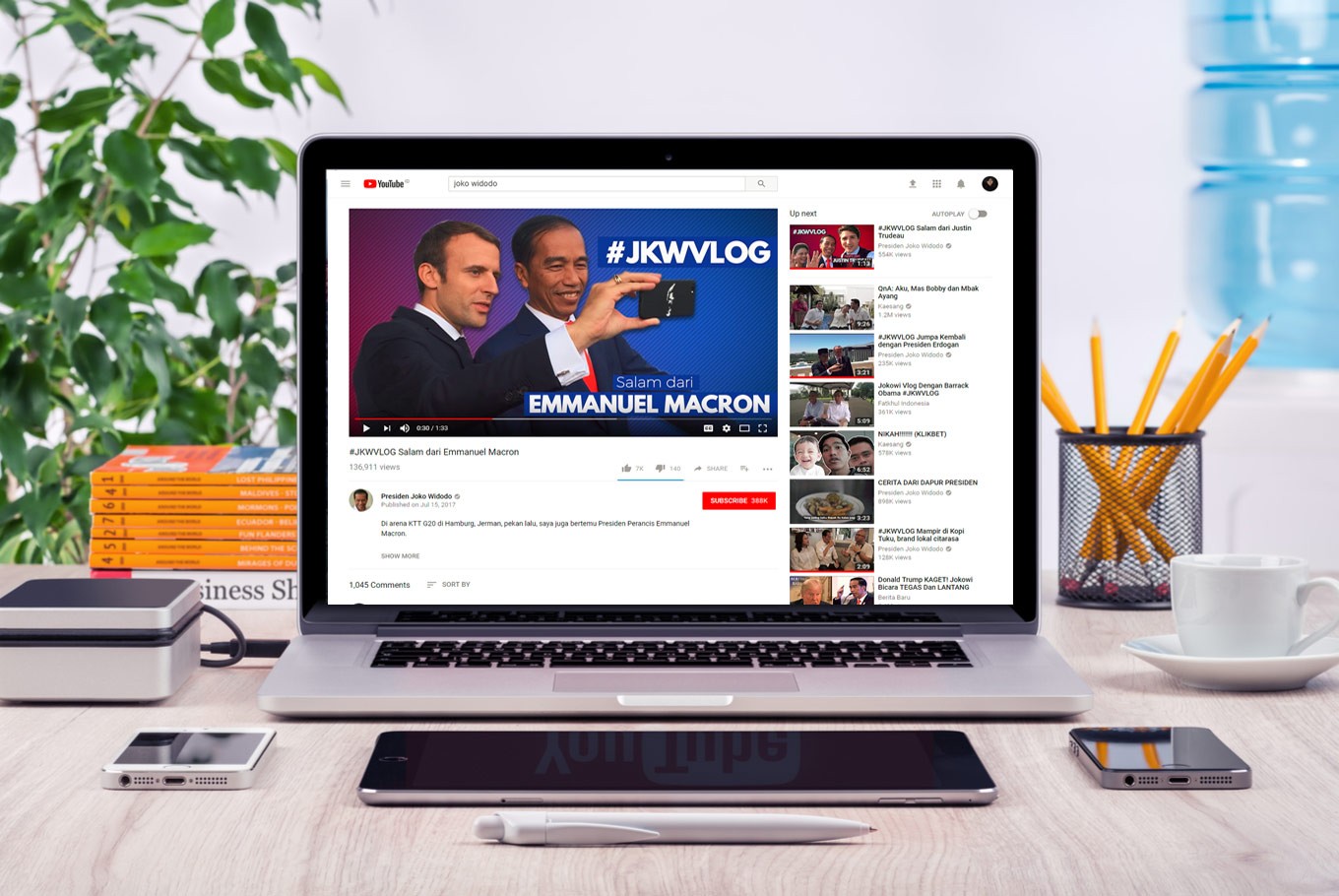Popular Reads
Top Results
Can't find what you're looking for?
View all search resultsPopular Reads
Top Results
Can't find what you're looking for?
View all search resultsJokowi's vlogs entertaining, but public needs to be more critical
The president and high-ranking officials are popular and active on social media, in line with today’s political communication trends.
Change text size
Gift Premium Articles
to Anyone
T
he president and high-ranking officials are popular and active on social media, in line with today’s political communication trends.
The growing entanglement of social media with politics and the rise of digital media have shifted political communication into one that is image-obsessed and hyper-mediated, where political life is conducted under the gaze of the ever-present media.
Way back in 1967 the philosopher Guy Debord in The Society of the Spectacle seemed to have predicted how portrayal of lives in the media subverts real lived experiences.
This age of ubiquitous visibility can become a source of fragility for politicians, thus it should be well managed. This is especially the case for incumbent policy-makers who wish to sustain their tenure like President Joko “Jokowi” Widodo.
Amid mounting discontent over corrupt politicians, there are higher expectations of the president to articulate his political message and policies convincingly while avoiding the risk that his remarks may be published in ways that conflict with the images he wishes to project. In this case, internet-enabled media suffices the need to articulate the spectacle form of governance and presidency directly to the population.
With more than 130 million internet users and slightly over 50 percent online penetration, Indonesia is fertile ground for the president from which political support could be drawn through internet-based media, so far as content is simple, relevant and engaging, to maintain audience attention.
Indeed, proving himself to be adept at exploiting the hybrid media system, the president has translated his cultural capital, accrued through his portrayal as wong cilik (commoner) and a differently effective politician, into the political field, using his personal stories to enthuse his social media followers and his loyalists dubbed Jokowers.
The president’s optimal use of social media to translate his vision of “work, work, work” and his distinctive public image signals an active political leadership, hence his popularity. While citizens may be ill-equipped to distinguish political fact from well-chosen, performed stories, thus rarely recognizing the presidents’ activities as rhetorical illusions, media organizations seeking to make politics more palatable to ordinary citizens seem ready to reconfigure the messages from the president, augmenting his ubiquitous presence.
The president’s video blogs (vlogs) and social media posts are intriguing examples of closer associations of politics with popular culture. They redefine rhetorical presidency to the extent that the friendly relationship with world leaders and Cabinet members as well as the president’s regular blusukan or impromptu visits have replaced intelligent speech and impartial, effective policy.
Jokowi’s interaction with the other member state leaders in the latest G20 Summit in Hamburg, for instance, creates an impression of the global community’s acceptance of Indonesia.
Short videos on infrastructure development projects capture progress and favorable viewpoints while eliminating dissenting voices and critics. Meanwhile, the popularity of the president’s vlogs revealing his daily life as a father and grandfather, his visits to schools, and Q&A sessions with citizens points out to the growing politicization of the private persona through heightened focus on Jokowi’s personal life and characteristics.
Jokowi’s social media activities bare many similarities with those of commercial brands, reflecting how the need to market politics has inevitably transformed political communication into one that is greatly professionalized. Here, social media features that enable visualization and aestheticization of presidential rhetorical performance represent yet another political marketing toolkit for the president and other tech-savvy politicians.
Therefore we should wake up from the fetishization of internet’s undisputed capacity to enable more democratic processes -- as the internet has not yet significantly changed traditional political relationships between political elites and citizens.
This hyper-mediated environment of political communications can produce deceptive imagery, thereby minimizing rational discourse, disguising political intention, misdirecting citizens’ attention, and making prominent only the issues that align with political elites’ interests.
This environment enables the subtle transition of political communication toward one focused on management of visibility, as a compromise of ineffectiveness in dealing with the more process-oriented political developments and national problems that matter to the majority of the population.
With public discourses greatly controlled by the political elites, citizens are deprived of openly debunking and unpacking so-called sensitive issues, including past and ongoing human rights abuses in resource-rich provinces to communism-phobia.
With a mass audience exposed to and focused on the more sensational bits of politics without contextualizing and digesting them properly, official politics becomes vulnerable to manipulation by demagogic leadership. This hyper-mediated age thus requires citizens to become critical in their news consumption and reproduction, and demanding counter-narratives in the public sphere. However, a media-educated citizenry needs to be supported by responsible journalists who strongly uphold their codes of conduct.
***
Debora I. Christine is a graduate student majoring in media, communication and development at the London School of Economics and Political Science. Daniel J. Nathanael is an undergraduate student in development sociology at Universitas Negeri Jakarta.
---------------
We are looking for information, opinions, and in-depth analysis from experts or scholars in a variety of fields. We choose articles based on facts or opinions about general news, as well as quality analysis and commentary about Indonesia or international events. Send your piece to academia@jakpost.com.










